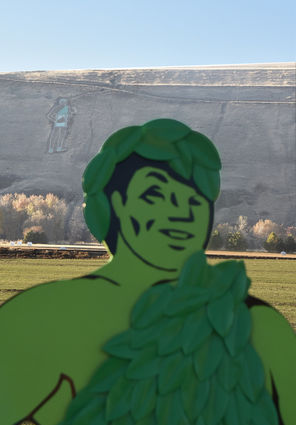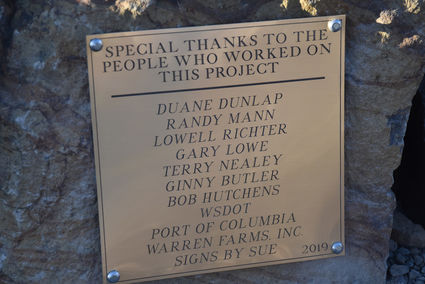COMMENTARY
Giant effect on the Valley
December 5, 2019
Like a song taking you back in your mind to a different time and place, the recent dedication ceremonies commemorating the giant Green Giant on the valley's hillside, and the Highway 12 vehicle pullout, brings back memories not only for the "regulars" who spent their careers with the Giant, but also those of us fortunate enough to have been in that time and place, and to have the now-unattainable opportunities that company made possible.
Green Giant Company had plants here and in Waitsburg, which is where I nervously went to apply for a summer job as a 16-year-old in the spring of 1974. My dad knew that Vic Hawkins, the irascible Personnel Manager in Waitsburg, loved pecans, so I took him some on his advice. The bribe apparently worked, or maybe it didn't. There probably wasn't a boy or girl wanting a job that didn't get one.
The volatility of pea harvest meant that some days or nights there'd be work, some there wouldn't, especially in June. (July was a different story.) We workers dialed, yes, dialed, the office number to either get the recording or a busy signal. Vic was colorful and unique on these recordings, sometimes peppering them with pithy comments.

Vic's "no work tonight!" was music to our night-shift ears, meaning we had the whole night to carouse around and then keep going after Johnny Carson until it was time to sleep in the wee hours of the morning.
I started in the Closing Room in Waitsburg, under the watchful guidance of Lester "Corky" Callahan, a compact, hair-triggered Irishman who commanded respect and ruled the crew with a firm hand. Stay on Corky's good side and you were golden; woe to anyone who challenged his authority, though.
I can't help but think that as a classmate of his daughter Karen, and under the wing of his son Jim's girlfriend Carrie Mae, I got a little favoritism. I started raking cans on the 211 line, those little eight-ounce cans. Then I moved to Line 3 and the 303s, which was operated by Carrie Mae. She taught me to cat-call whistle, something necessary when your hands were full of a rake and spilling cans and you needed to signal the line to stop.
Now, 46 years later, the experiences are deeply romanticized yet sometimes I'd give almost anything to go back there. I still remember the dragging monotony of the two o'clock hour when, after raking cans for at least six hours, you'd look at the clock and it had only moved seven minutes.
Peas really roared in July and we'd work night after night, finishing by pressure washing the pea snot off of the froth washers...a couple of hours of agony with high-velocity spray coming right back into your eyes and White Hat Donny Wills pointing out the slime you missed.
After two summers raking cans, my brother Charlie, who worked nights in the warehouse for John Delp, didn't come home for his summer job, and Vic Hawkins, who followed some kind of genealogical hierarchy, promoted me to my brother's old job: lot mark checker. The job consisted of writing "EJPs" (early June peas) and "84 14" (84 cases and 14 cans) in triplicate with carbon paper on index cards, then stapling two to the cardboard cap so the lift truck drivers could move the pallets of peas into storage, the third filed so we'd know where everything was stored. All this amid the swirl of lift trucks loading rail cars with product and unloading empty cans and packing them to can supply.
It was sticky, hot work until about 1 a.m. when the cool night air finally overcame the heat of the day and the temperature radiating off of recently retorted cans of peas. John Delp was patient with the rookie and eventually I developed the mental math skills to handle lot changes. I would work frantically 12 hours through the night then, in my sleep, do the job over and over. Then get up and go do it again.
The cannery introduced us Washington kids to a whole new culture: girls and boys from the South. There was Cliff Colia from Louisiana, I think, who was the typesetter in Corky's closing room. Bob Mings of Longview, Tex., was an amazing artist who pushed tubs and could caricaturize anyone. Cliff's buddy Bam Bam (Bill Morris) ran the retorts.
These kids were college age and were on an adventure of their young lives, driving west across the United States to make money for the next year of school. They bunked in an old apple-packing shed under the management of "Art Bunkhouse.
We marveled at their accents and vocabulary. To us a girl might be cute; to the southern boys, they were "fine." Not fine, but "fainnn." (Drop your jaw on the vowel.)
As a night shift worker, I'd be up about 4 in the afternoon and so had time to do stuff around town before heading to the warehouse at 7 p.m. I ran into a guy from Texas with a gap-toothed smile who had driven a hopped-up Volkswagen to Washington for the job. He was sitting at a picnic table in Waitsburg's Preston Park, with a loaf of Wonder bread, a pint jar of mayonnaise and a package of baloney. He'd set out two pieces of bread, stick his index finger into the jar, slather the bread with mayo, put a couple slices of baloney on it and chow down.
Working the cannery meant about $3,000 of income over the summer and with the money saved while in high school, it meant relative financial independence in that era. The summer job meant tuition, room and board for the following year at college. I finished my education debt free, almost unheard of these days.
Several years ago, a guy with a Southern drawl ambled into the office. He was a retired attorney and judge from South Carolina on a pilgrimage back to the Touchet Valley to see where he'd spent several summers in the late 1950s and early '60s, working in peas to fund his education.
Corky Callahan was equally proud of a number of young men he mentored, a few who ended up as doctors and lawyers. He especially remembered San Dewayne Francisco, a young man from Burbank who went into the military and whose name is now engraved in black granite in Washington, D.C.
Sadly, due to circumstances bigger than simply the departure of the Green Giant company from the Valley, the notion of young people working a summer job and making enough to cover a year of college is gone, unless you're a scion of a farm family.
But for those of us fortunate enough to have experienced working for the "Giant," those memories are priceless.


